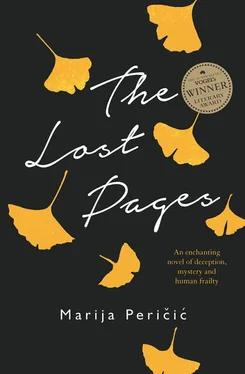Back in my office, I could not concentrate on my work. I pulled my chair to the window and sat looking out, brooding over the situation. Life on the street continued, indifferent to my plight. I watched the people hurrying along the footpath, each of them absorbed in their own joys, their own sorrows. The dinner was the following evening. Although I was fairly certain that Theodor’s letter was not a joke, I was not at all certain about his state of mind or how serious his threat was. It was true that his patience with me had been waning of late, and that I had violated our agreement. But I had always believed that he and I enjoyed a special relationship that went beyond the terms of a mere contract; we had, at any rate, before Franz came on the scene. Franz had destroyed all that. Now it seemed that I was nothing more to Theodor than a means to secure Franz, like a piece of bait for a prize fish. I resolved to slip out of the office early that evening and return to Poříčer Strasse to try to ambush Franz as he left his office at the end of the day.
I arrived at Poříčer Strasse just before five o’clock and took up a position directly opposite the insurance office. I kept my eyes trained on the street door of the building, tensed and watching for Franz. Five o’clock came and a few workers left the building, but Franz was not among them. My eyes burned into the wood of the door. It was a heavy double door, painted green, of which the left wing swung back into the dark entrance hall. I stared intensely, willing the door to open and reveal Franz, but it did not obey me. The sun was setting and it grew cold as the buildings began casting their damp shadows. At half-past five a regular trickle of workers began to issue from the doors, and I crossed the street to be closer, but Franz still did not appear. By six o’clock the trickle had slowed and only the occasional person came through the door. Most of the lights in the building had been switched off. It was time to go.
I was tired and hungry. With the last of my energy I made a rapid tour of the cafés I had visited the previous evening, again with no result. My last stop was at the Café Slavia, where I stopped for a beer and a quick meal. It seemed that there was nothing to do but wait and hope that if Franz did not appear at the dinner Theodor would understand that it had nothing to do with me. I was sitting beside the window that looks out at the National Theatre. The statues along the roof were all illuminated and my eyes could pick out every detail of their faces against the black of the night sky. Down on the theatre steps a small crowd stood laughing and calling to one another—actors, by the look of their clothes.
I reflected on the irony of my plight. Now it seemed likely that my fervent wish of Franz and Theodor never meeting might come to pass, but the very thing I had desired for my own self-preservation would be the cause of my downfall. Looking into my beer, I considered the problem as I might a difficulty in a narrative plot. It was very simple: Theodor wanted to meet Franz, but Franz apparently did not want to meet Theodor. I did not want the two to meet, but if Theodor did not meet Franz, I would be sacrificed, thus I was forced to facilitate the meeting against my will. What Franz wanted, or why, did not remotely concern me. I finished my beer and ordered another. If only, I thought to myself, Franz really were dead, this whole situation could easily be resolved in my favour. This would be the ending that I would choose if this were a story and I the author. It was not even really necessary that he be dead; emigration would suffice, or serious illness.
Theodor, I mused, had never met Franz and was relying on me to introduce him. He did not know who Franz was. If Franz really were dead or otherwise safely out of the way—and, as I had suggested to Theodor, we did not know for certain that he was not—I could simply present some other person to Theodor as Franz. No one would ever know the difference, provided that the ‘Franz’ I introduced was credible. Perhaps it was not even necessary that Franz be out of the way for my plan to be feasible: to the real Franz it would simply appear that Theodor had finally lost interest and given up.
I was now on to my third beer and the potential benefits of this solution seemed limitless. It was perfect. I would regain Theodor’s favour by giving him what he was unable to get for himself; Theodor would get his precious contract signed; I would have time to find my feet again with Schopenhauer. The problem of Franz would be neatly solved without the need for any drama or confrontation. He would simply fade away as if he had never been. Granted, the book of stories would possibly go ahead, but I could certainly contend with one book. The more I thought about it, the better the idea seemed. The relief of having Franz out of the way was immense. I even began to feel grateful to him for being so evasive; what had been an irritating problem, a cocky affectation, began to seem like a rare gift from him to me.
Somewhere along the line I had begun thinking of the whole enterprise as a fixed plan rather than a mere hypothetical possibility. The only question was, who could I use to play Franz? Obviously it would have to be someone unconnected with literary circles, preferably someone from outside Prague. Someone I could trust. I ran through my host of cousins and in-laws, a cohort of whom lived in Brünn. But what explanation could I possibly give them? And how could I arrange it all within twenty-four hours? It was impossible. I would have to look closer to home. I half-heartedly scanned the room for likely candidates. There was no one who really resembled Franz, but perhaps this was not a necessary requirement. I looked out of the window and my eye fell on the theatre opposite, still wreathed in its yellow glow. Of course: an actor. There could be nothing better than having a professional undertake the task.
The group of actors who had been standing on the theatre steps had left; it was by now very late. I had also drunk rather more than I was accustomed to, so I resolved to consider the plan afresh the next day. I made my way home, feeling warm and sleepy, with my belly full of beer and the satisfaction of having conquered adversity.
The next morning the idea had not lost its piquancy. I did not feel the slightest bit apprehensive; on the contrary, I felt a self-congratulatory thrill at my own inventiveness. I dressed, humming to myself, and went downstairs to eat a leisurely breakfast and read the Prager Tagblatt . I decided to take the morning off work to organise the matter. The dinner was that evening, but this did not worry me in the least. Surely the whole thing could be arranged in less than two hours. I turned my mind to the question of where to find an actor. There were of course the national and municipal theatres, but I thought that it might be more prudent to look at one of the smaller dramatic societies, where the actors were more likely to be unknown. As I drank another cup of coffee, I looked at the entertainment notices at the back of the newspaper and copied down the names and addresses of some of the smaller dramatic societies into my notebook.
I decided to make my first call the Bohemian Company, a students’ acting group. They had a theatre close by, near the opera building. Outside in the street the day was bright and clear and I made my unhurried way through the morning crowds. The prospect of having solved the niggling problem of Franz had me smiling broadly as I walked along. The sun warmed my skin and I had the benign feeling of a man on holiday. The only thing that remained now was what to tell the actor who I would engage. The true story was out of the question, naturally. I considered my options. I could pose as a director, an eccentric director, and present the thing as a kind of audition. But word of that might get out and I needed to keep this as quiet as possible. Ideally I would tell as few people as possible, but approaching a theatre troupe meant that of course the whole group would come to hear of it. It would be much better simply to approach an actor individually. I ran through those of my acquaintances who acted, but of course those known to me might also be known to Theodor.
Читать дальше












